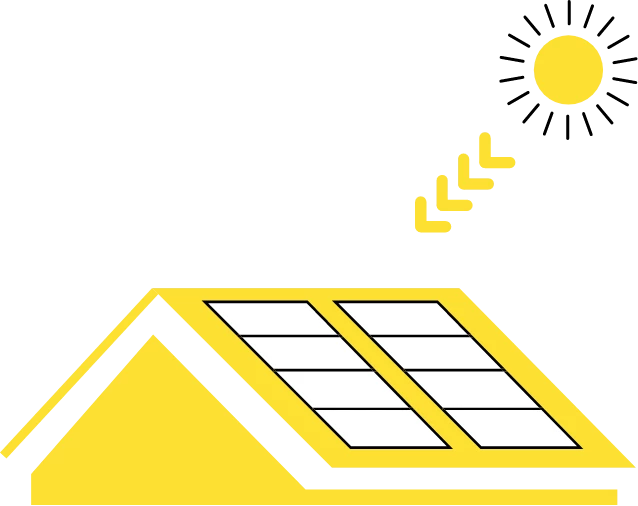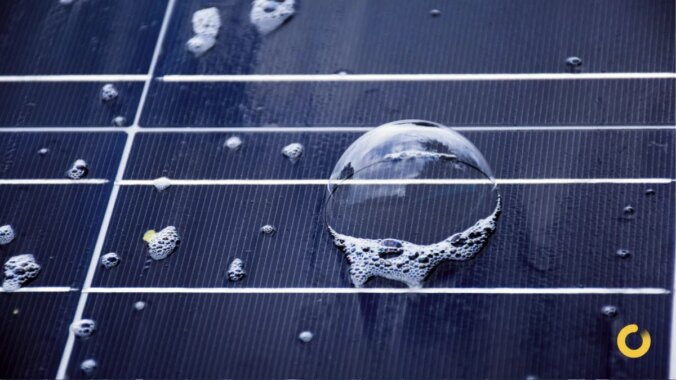How to clean your solar panels?
Run away from dirty solar panels! We teach you the keys to maintaining and cleaning your facility
Reading this article will take you less than 9 minutes

Solar panels must be exposed to sunlight to produce energy, therefore, they are also exposed to inclement weather. However, unless you live somewhere with a high level of pollution, dust, sand or snow, your photovoltaic solar panels do not need to be cleaned frequently .
In most cases, the rain is more than enough to keep the solar panels clean. Although it may be a good idea to “water” the photovoltaic panels occasionally if you live in beach areas or areas with high pollution. Below, you will find the answers to the main questions that the owners of self-consumption facilities have about the maintenance of solar panels and the cleaning of photovoltaic modules .
Maintenance of solar panels
Photovoltaic panels have a high durability and resistance, therefore, it is not necessary to pay much attention to the maintenance of solar panels in residential solar self -consumption installations.
With the exception of photovoltaic panel installations with trackers, an installation has no moving parts, which means that the risk of breakdowns and problems decreases significantly. In order to be able to observe any live variation of your installation and anticipate immediately in the event of an incident, installers recommend placing performance monitoring devices .
In most cases, the solar panels are cleaned directly with the rain. However, in areas with a lot of wind, high pollution, dust or dirt, production can decrease by up to 15% throughout the useful life of the solar panel installation. This percentage may increase or decrease depending on three factors:
- The type of dirt , since a bird droppings will not be the same as a little dust.
- The type of installation , if it has optimizers or not, if it has been installed in series or in parallel .
- The inclination of the panels , for example, some panels with more inclination better receive rainwater and this natural cleaning, and vice versa.
To mitigate this effect, it is necessary to clean the solar panels.
- In the case of solar panels on sloping roofs , it is advisable to hire a professional maintenance and cleaning service . Many local installers offer these services or recommend professional solar panel maintenance companies they trust.
- If the panels are easily accessible , you only need warm water and low pressure.
Products to clean solar panels
The most important aspect to take into account if you are cleaning your solar panels is that you should not scratch or damage the glass , since doing so will reduce the energy production of that panel to a greater or lesser extent .
The best way to clean solar panels is:
- With warm water and carefully, in the same way that you would when cleaning your windows. Try to use only water , and if you use a product, make sure it is one that does not leave residue, such as dishwasher soap.
- To remove dirty water or excess lime , you can use any utensil that does not press or scratch the panels. For example, a scraper or glass cleaner.
IMPORTANT! CLEANING MUST BE DONE FIRST THING IN THE MORNING
Clean the panels before they begin to shine, to avoid temperature contrasts that can cause glass breakage.
And remember, avoid damaging or scratching the glass of the plates at all costs . If you live near a highway with a high frequency of trucks or close to an airport , oily stains may appear on your license plates. It is easily and simply removed using a little isopropyl alcohol and a rag. However, the use of “strong” cleaning products is not recommended , as they can damage or even scratch the glass.
How often do you have to clean the solar panels?
At least once a year , at most two. As we mentioned, this will depend on the area in which you live. If you live in an area that is regularly affected by dirt caused by sand, trees or birds, the panels should be cleaned more frequently.
Is it worth paying for a photovoltaic solar panel cleaning service?
Just like going to a car wash, there are professional options that will take care of cleaning and maintaining your solar panels for self-consumption for you. Some solar panel installers include cleaning options in their maintenance fee. They could also budget them separately or recommend a company specialized in this work.
If your installation is on your deck or roof and it is difficult to access , it is advisable that you hire the services of a professional for security reasons. You’ll only have to do it once a year or every two years, so it won’t be a big outlay and you’ll avoid unnecessary risks . Cleaning services won’t do a significantly different or better job than you can (they’ll simply make your solar panels stop being dirty), but they are equipped to clean and maintain the cells in a safe way.
In the event that you have the photovoltaic panels installed on the ground, it is not worth hiring the services of a cleaning professional, since you can clean the solar panels yourself with a hose.

Special cases
HAIL
The photovoltaic cells that make up the solar panels are made of silicon. The panels, in turn, are covered by glass, and although this material is quite resistant, a weather phenomenon that is too aggressive could cause serious damage to your installation. For this reason, we always recommend including the panels in your home insurance. This should not lead to an increase in the fee, although it depends on your insurance.
In any case, the probability that the hail impact affects the solar panels is minimal . In the event that something went wrong, there are guarantees that cover these incidents.
SNOW
In areas where snowfall occurs periodically, it is only necessary that your solar panels have an inclination greater than 15º so that the snow does not accumulate . In addition, the melting process is usually fast and favors the cleaning of the panels as if it were a natural maintenance.
Generally, it is not necessary to remove snow from solar panels as it will move on its own. Most solar panel installations are tilted at a certain angle, and the snow will naturally move by gravity as it melts.
If you notice snow lingering on the panels, you can purchase a roof rake specifically for solar panels. The use of this type of tools allows you to safely remove snow without damaging or scratching them and consequently reducing their energy production. For this reason, it is important not to use a standard broom, shovel or any other non-specialized tool to remove snow from solar panels.
If you need any information or want to know how much your installation of solar panels would cost, do not hesitate to contact us , the experts will be happy to answer all your questions and offer you a free fully personalized study.
Solar Panel Warranties
Manufacturers offer different guarantees on their solar panels to provide support and coverage in the event of an unlikely incident , such as a breakdown due to hail or falling branches or other objects.
- Production guarantee: refers to the fact that the performance of the nominal power of the solar panels will not drop below a certain level throughout the useful life of the installation. This guarantee lasts up to 25 years. A large part of the manufacturers use the 80th percentile as a guarantee, that is, at 25 years they deliver 80% of the power of the solar panels in year one.
- Additional guarantee: directly related to the previous one, it is the same as the production guarantee, but in a much shorter period of time. Some manufacturers guarantee panel performance will not drop below 90% of year one power rating for the first 10 years.
- Labor guarantee: although it has nothing to do with the operation of the panels, it protects the client’s roof and the materials on the work of the installers; wiring, conduits, electrical protections, sealing of roof anchors, etc.
At Blue Solar Panel we can advise you from the first moment so that you don’t have to worry about anything, we will help you choose the best solar panels and we will advise you on what type of maintenance you should do depending on where you live.


Leave a Reply